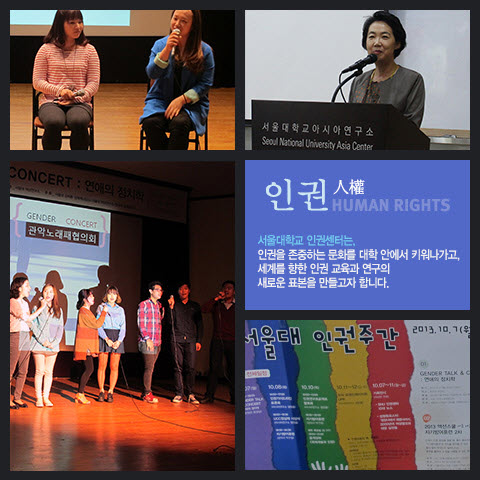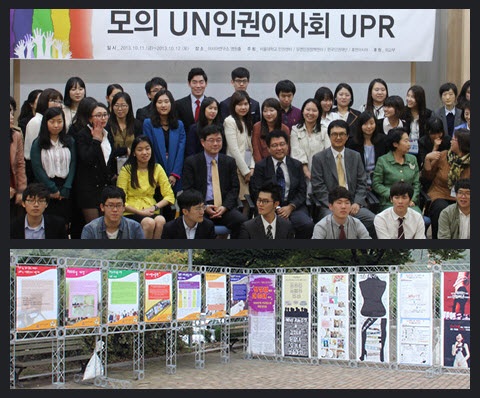 The term “human rights” can be one that is not often thought of in our daily lives. At Seoul National University (SNU), many students have been in a position of privilege, having access to all the resources necessary to pass the rigorous examinations and interviews to enter such a prestigious university. Thus for those who have rarely experienced less privileged situations, human rights can be a term that is often overlooked. However the entire concept of human rights is essential in today’s society, particularly in the context of a university. There are certain inalienable rights that must be respected. This past October 6 to 8 the Seoul National University Human Rights Center (SNU HRC) hosted the ‘2nd SNU Human Rights Week’. The event was comprised of diverse programs that discussed human rights issues concerning the university and the nation, and sought to familiarize members of the SNU community with the term “human rights” so as to encourage them to share and communicate their unique views on this term.
The term “human rights” can be one that is not often thought of in our daily lives. At Seoul National University (SNU), many students have been in a position of privilege, having access to all the resources necessary to pass the rigorous examinations and interviews to enter such a prestigious university. Thus for those who have rarely experienced less privileged situations, human rights can be a term that is often overlooked. However the entire concept of human rights is essential in today’s society, particularly in the context of a university. There are certain inalienable rights that must be respected. This past October 6 to 8 the Seoul National University Human Rights Center (SNU HRC) hosted the ‘2nd SNU Human Rights Week’. The event was comprised of diverse programs that discussed human rights issues concerning the university and the nation, and sought to familiarize members of the SNU community with the term “human rights” so as to encourage them to share and communicate their unique views on this term.
The Seoul National University (SNU) Human Rights Center was established in July 2012 under the leadership of Professor CHUNG Chin-Sung (Department of Sociology). Director Chung stated that the purpose of the SNU Human Rights Center is “to create a university where all members care for one another and are equally respected.” Apart from receiving reports of human rights violations, the Center also focuses on the need to educate and create a culture of respect throughout the university. The Center has made an effort to create such a culture of respect within the community through various methods. It conducts specialized training programs for independent departments, organizes forums and symposiums for SNU community members, and provides various programs and activities for students to directly participate in. One such activity is the SNU Human Rights Week, the first of which was held in fall of 2013.
This year’s Human Rights Week was comprised of five parts. The first part was the final presentation of the Human Rights Research Project, a project funded by the SNU HRC for groups of students to carry out research on certain topics regarding human rights. On the first day of the event, the selected student groups gave their final presentations, a result of numerous months of vigorous research.
The second program was a special lecture entitled ‘Human Rights and the Army’. The Director of the Military Human Rights Center LIM Tae Hoon was the guest lecturer and he discussed the human rights situation of the Korean army. He provided insight on recent human rights violations cases in the Korean military that have troubled the nation. Due to the sudden exposure of military human rights violations cases in recent months, students showed particular interest in this special lecture.
A ‘Human Rights Film Festival’ was held during the three days of the event as well in the Cultural Center of the university. The film shown on the first day, First Dance, was about homosexuals and the rights of lesbians. The second film, Now, Let’s Dance, was about abortion and the fetal right to life versus the right to self-determination. Hunger is a film about terrorism, the IRA, and prisoners’ rights. The three films were shown in one of the largest theaters located on campus and were an opportunity for students to view films not usually shown in mass media.
The ‘Human Rights Bamboo Forest’ was set up in front of the Student Center Building for the full three days. The artificial bamboo forest was made so that all members of SNU, including professors, students, and staff could write their thoughts on human rights issues around campus. Participants could also take photos in front of the ‘Human Rights Bamboo Forest’.
 Another event that occurred throughout the complete three days of the program was the ‘Human Rights Bus’ and the ‘Human Rights Bus Stations’. A university shuttle bus was decorated with the colorful posters of ‘SNU Human Rights Week’ and circulated around the campus. The ‘Human Rights Bus Stations’ had four designated locations -- the College of Business Administration, College of Agriculture and Life Sciences, College of Engineering, and Dormitory Junction. At each station there were various activities to enhance students’ understanding of the difficulties minorities experience on campus. For example, there were challenges such as “Write your class notes with your foot instead of your hand” or “Try to understand what your friend is saying by just looking at the mouthing of words” for students to think about what life would be like for students with disabilities.
Another event that occurred throughout the complete three days of the program was the ‘Human Rights Bus’ and the ‘Human Rights Bus Stations’. A university shuttle bus was decorated with the colorful posters of ‘SNU Human Rights Week’ and circulated around the campus. The ‘Human Rights Bus Stations’ had four designated locations -- the College of Business Administration, College of Agriculture and Life Sciences, College of Engineering, and Dormitory Junction. At each station there were various activities to enhance students’ understanding of the difficulties minorities experience on campus. For example, there were challenges such as “Write your class notes with your foot instead of your hand” or “Try to understand what your friend is saying by just looking at the mouthing of words” for students to think about what life would be like for students with disabilities.
After completing each of the four stations, students received a stamp on a map. Once all four stamps were received, students took their stamped map to the ‘Human Rights Bamboo Forest’ where organizers checked their completion and gave them a portable battery as the final prize. The ‘Human Rights Bus Stations’ were organized for the purpose of promoting understanding of the reality faced by students who are considered minorities at SNU -- students with disabilities, foreign students, sexual minorities, and female students. Another purpose of the ‘Human Rights Bus Stations’ was for students to think about solutions to improve the status of minorities so that they may become principal members of the SNU community.
Modern society tends to create individuals who are pressed to think about their careers and future. In such an environment, individuals may not be aware of human rights. The 2nd Human Rights Week provided various activities for members to become more familiar with the term and the broad range of issues related to human rights. HONG Ji Yong (College of Electrical Engineering) participated in the activities and expressed that “the various programs allowed students to participate and share their experiences and their views regarding human rights issues on campus. I enjoyed the ‘Human Rights Bamboo Forest’ in particular because participants could not only write down their views, but also read and write comments on the writings of others. It allowed for more communication and sharing between members of the SNU community.”
The essence of the 2nd Human Rights Week was for members to become acquainted with human rights, discussing what each individual believed human rights are and what that means in this particular context. Human Rights Week testifies to the continuing importance of the debate on human rights and its significance in the university context. In particular for educated students at one of the most prestigious institutions of the nation, individuals of the SNU community must constantly be aware of this issue and must have the responsibility to act in a manner that fosters an environment of care and respect for one another.
The SNU Human Rights Center is located on the 3rd floor of Building No. 153 (Woojungwon).
For more information on the Center and its activities, please visit http://hrc.snu.ac.kr.
Written by OH Jung Eun, SNU English Editor, josefinaoh@snu.ac.kr
Reviewed by Eli Park Sorensen, SNU Professor of Liberal Studies, eps7257@snu.ac.kr
Proofread by Brett Johnson, SNU English Editor, morningcalm2@gmail.com

